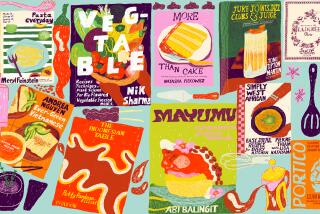California Cook: Seven steps to becoming a better cook
It happens every year about this time. Well stuffed from great holiday feasts, full of the kind of hopeful ambition that a new calendar brings, millions of people resolve that this year, finally, is going to be the one when they learn to cook better.
And so they run out and buy the hottest cookbook from some celebrity chef, try two recipes and quit in disgust.
That’s a shame because cooking for yourself — really cooking, not just throwing the occasional fancy dinner party — is one of the most rewarding things anyone can do. It’s pleasurable and it’s healthful, and how many things can you say that about?
And folks, it’s just not that hard. Or, at least, it doesn’t have to be. Here are seven steps that will make you a better cook, whether you’re someone just starting out or you’re a little farther down the road.
1. Pay attention. This is rule No. 1, particularly when you’re just starting. Put away your cellphone. Turn off the TV. Facebook will wait. Focus on what you’re doing. Be aware. What does the food look like? What does it smell like? How does it sound? These are all important hints the dish is giving you — the way bubbles change size when a sauce is being reduced; the smell of a pie shell when the flour begins to brown; the sound a roasting chicken makes when it’s nearly done. File the information away, and remember it next time.
2. Keep it simple. You don’t learn to drive by entering the Grand Prix, and you don’t learn to cook by starting with some complex, multi-element dish. Begin by learning a few basics: a vegetable soup, an omelet, a salad dressing. Repeat them until you’re satisfied with the result. It won’t take long (perfecting them, on the other hand, can take a lifetime). Move on to another dish only after you’ve mastered the first ones. Only by this kind of repetition will you come to understand what is going on during cooking, rather than simply obeying recipe commands.
3. Shop carefully. You can always spot good cooks because they take their time choosing ingredients. Beginners rush through, thinking cooking only begins once they get in the kitchen. Really, it starts in the market: Choose the ripest pieces of fruit, the most deeply colored vegetables, the crispest greens, even if you have to sort one piece at a time. Spend an extra 10 minutes choosing the best ingredients and it will save you hours of time cooking. Shop wisely and the simplest dishes will be delicious; hurry through and you’ll have to work some kind of crazy kitchen magic just to make something decent enough to eat.
4.Taste. Taste. Taste. Like the old joke about voting in Chicago — taste early and taste often. Don’t wait until a dish is almost finished. Not only might it be too late — flavor is built up in layers — but you’ll miss some important learning opportunities. Notice how the flavor of a tomato sauce deepens as it cooks. Watch how the taste of a carrot goes from simple and one-dimensional to rich and sweet. And when it comes to seasoning, remember that there’s more to it than sweet and salty. Many otherwise dull dishes can be fixed quite easily with a jolt of acidity — lemon juice or vinegar.
5. Organize. Read the recipe. Now read it again. To the end! Figure out which utensils you’re going to need and which ingredients. But — and I know this is a heresy — in most cases you can forget about having everything prepped and chopped before you begin (the hallowed mis en place). Cooking at home is different than in a restaurant, and unless you’re making a stir-fry or something that needs to be cooked bang-bang, it’s more efficient to slot in some tasks during the dead time when you’d otherwise be standing around watching water come to a boil.
6. Tools, not gadgets. Tools are what you turn to every day; gadgets have only one very specific use. Buy what’s most necessary in the best quality you can afford. Start with a chef’s knife, a paring knife, a sauté pan and a large saucepan. Later you can add a roasting pan, a steamer/pasta pot, a nonstick skillet and a small saucepan. Remember that while the most expensive brand isn’t necessarily the best, it’s worthwhile to spend a little more to get better quality. After all, if you’ve shopped well, these are tools you’ll be using almost every day for the rest of your life.
7. Make a commitment. Learning is a process, not a single step. Becoming a good cook is going to take a little time. There’s more to it than reading a recipe and following a set of instructions. Don’t become discouraged if your first — or even fourth or fifth — effort isn’t as perfect as you’d like. Figure out what went wrong, remember it and move along. It’ll be better the next time.
More to Read
Eat your way across L.A.
Get our weekly Tasting Notes newsletter for reviews, news and more.
You may occasionally receive promotional content from the Los Angeles Times.











